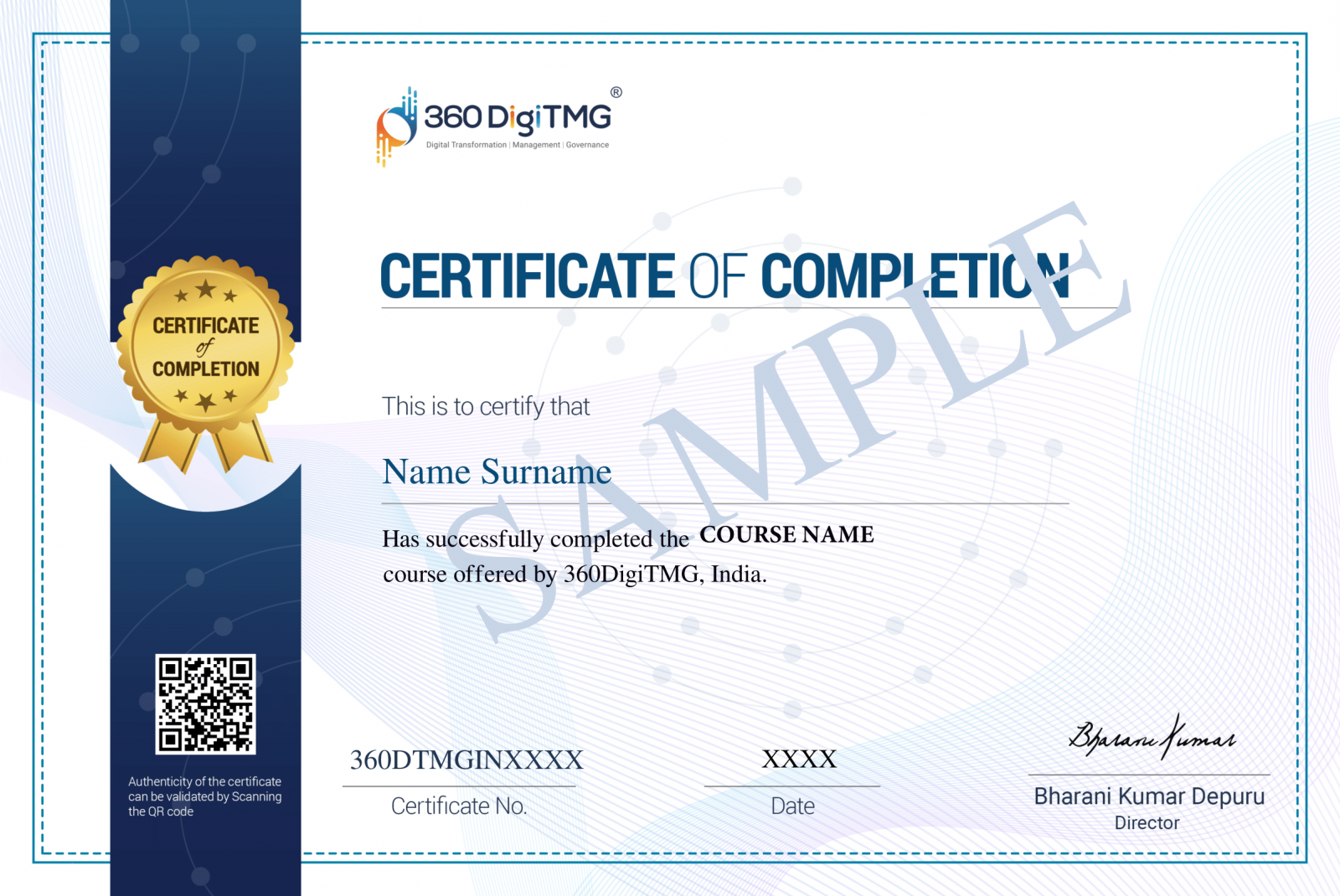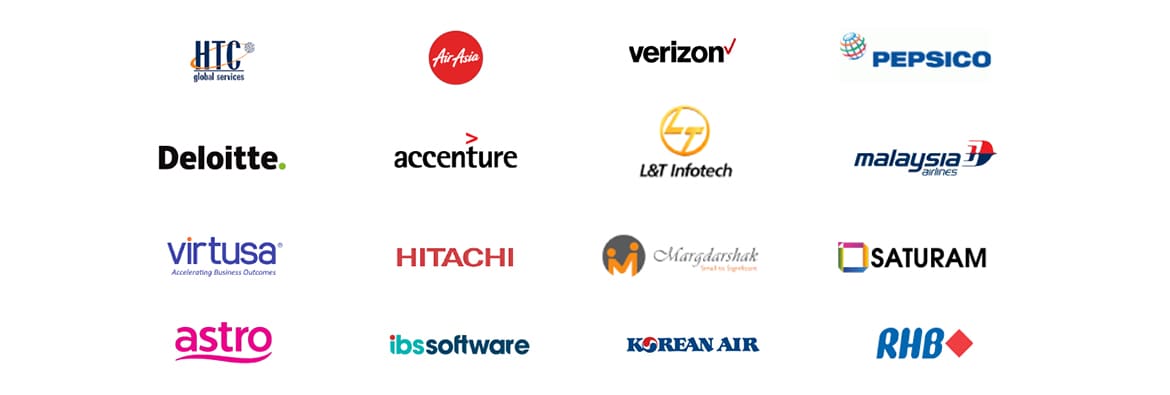Certificate Program in
Machine Learning on GCP
- 24 Hours Interactive Online Sessions
- 80 Hours Assignments & Real-Time Projects
- Aligned with Google's Professional Machine Learning Engineer
- Complimentary Python Programming
- Complimentary Machine Learning Primer
2064 Learners
Academic Partners & International Accreditations
Machine Learning aims to guide computers to learn from the data that is given to them and develop an ability to learn from it and make predictions without additional programming or the need for human intervention. Machine-learning applications provide better value to enterprises and are leveraged for fraud detection, inventory management, predictive marketing, etc. Today Machine learning capabilities when coupled with the cloud are called the “intelligent cloud.” Cloud provides access to huge volumes of data which is used as the main source of information for developing ML algorithms. There is a huge demand for ML on the cloud as it broadens the horizon for ML applications while making cloud computing more efficient and scalable. Join the ‘ML on Google Cloud’ course to learn cloud-related skills to get your dream job.
ML on GCP Course Overview
implement modern data pipelines. Investigate Google Cloud products like BigQuery, that help protect your data and combine them with machine learning APIs such as Natural Language API or Cloud Vision. Use Cloud SQL to migrate Hadoop and MYSQL to Google Cloud. Learn Deep Learning using TensorFlow along with the visionary features of GCP. Learn to convert raw data that allows machine learning to bring human insight into the problem and to integrate the right mix of parameters that give accurate results. Get hands-on practice on tools and frameworks that help in deploying machine learning models using ML infrastructure available on Google Cloud.
Define Machine Learning on GCP
Machine learning is a process that involves analyzing huge amounts of data using statistical techniques that helps software perform complicated tasks and make predictions without explicit programming. The cloud (GCP) is an ideal platform for Machine Learning as it provides cost-efficient data storage and high-performance computation which are preconditions for the success of any ML application. Machine Learning on Cloud has provided a unique insight into techniques, infrastructure, and framework needed to automate data-driven systems on a massive scale.
ML on GCP Learning Outcomes
The course brings you to the Machine Learning functions and Big data. Learn and apply fundamentals of machine learning concepts with the overview on Google Cloud and how to build machine learning models. The students will also explore the data processing capabilities of Google Cloud for analytics and machine learning. You will be able to design and deploy superior machine learning models in production with the GCP AI platform. The students will be able to deploy a trained model on the ML engine to make accurate predictions from data using feature engineering. With the open-source framework, TensorFlow, students will learn to build and train powerful ML models. Students will also be familiarized with machine learning concepts and learn how to derive insights from the data on the cloud. By the end of the course, students will be proficient in all aspects of application development, data engineering, infrastructure management, security, and will be able to design and create scalable solutions. Join the training on’ ML on GCP’ and you will also learn to
Block Your Time
Who Should Sign Up?
- IT Engineers
- Data and Analytics Manager
- Business Analysts
- Data scientists, technology heads, decision-makers
- Professionals with analytics knowledge
- Professionals with industry domain experience in various areas (banking, finance, insurance, mechanical, IoT etc.)
Modules for ML on GCP Course
Each module encapsulates the essential tools to impart machine learning skills using the two most popular programming languages Python and R. You will learn how to establish a gateway between different databases with R and Python and also how to connect to external sources of data. One of the major modules of Data Science is Machine Learning. Learn about the various modules that make up Machine Learning using the two most popular tools R and Python. As a data scientist one will be engaged in a multitude of data mining techniques in both supervised and unsupervised learning. One of the major variants of the same is reinforcement learning that enables machines to learn through rewards. Get introduced to all the supervised techniques of prediction and classification; learn about the major unsupervised learning methods and the application of reinforcement learning in Data Mining.
Learn two of the most powerful programming languages used in Data Analytics. Both R and Python are the top two tools used by Data Analytics professionals world over. Start learning from the very basics, right from installation and work your way up through simple commands, writing small functions and programs.
Both R and Python can connect to a wide variety of data sources. Under this module, learn how to establish a gateway between different databases with R and Python. Also, learn how to connect to external sources of data.
One of the major modules of Data Science is Machine Learning. Learn about the various modules that make up Machine Learning using the two most popular tools R and Python. Get introduced to the broad overview of ML and the various quality metrics with the help of R and Python.
In the real world, oftentimes, the datasets cannot be used as such and some amount of preprocessing activity needs to be done. Imbalance in the output classes is one of the common problems where sometimes the proportion may be as lopsided as 95% to 5% or even higher. Learn about the various methods and algorithms to address this problem of imbalanced data sets.
One of the integral parts of learning Data Science and working on Analytics projects is the sound understanding of Statistical tools. In this module learn about the need to know statistical measures and their application in Data Science. Also, learn how to visualize the data in a concise form to derive various meaningful insights.
The essence of analytics is to be able to get the story from the data. And for the data to be able to truly be useful one needs to munge the raw data to make it legible. Using tools like R and Python, learn how to manipulate data from the raw form to make it ready for subsequent ML algorithms. The topic is all the more important in the current context given that a lot of data is moving to the unstructured format.
Both R and Python while being classified under the object-oriented programming languages category, still require some traditional approach to programming whereby the user-defined function needs to be spelled out and the use of conventional program snippets is of utmost importance. In this module, learn how to create simple to complex user-defined functions and hone your programming skills in the context of machine learning.
As a data scientist one will be engaged in a multitude of data mining techniques in both supervised and unsupervised learning. One of the major variants of the same is reinforcement learning that enables machines to learn through rewards. Under this module, get introduced to all the supervised techniques of prediction and classification; learn about the major unsupervised learning methods and the application of reinforcement learning in Data Mining.
Under supervised learning one of the most popular methods of predicting numeric data is linear regression and for classifying categorical data is logistic regression. These two methods will be covered in detail under this module. And the participant will be introduced to multiple examples using R and Python.
Under the classification modeling, decision trees method has a special place even though they are not truly classification modeling techniques but rule-based algorithms. The popularity of Decision trees is in its simplicity, high accuracy, and most important the ability to explain behind- the- scenes working of the algorithm. Under this module, the participant will be introduced to working with Decision trees using R and Python.
Tools Covered

Trends in ML on GCP
With artificial intelligence and machine learning becoming the main area of focus in many giant organizations and when these technologies are integrated with the capabilities of cloud computing, it increases productivity and reliability along with being cost-efficient. The cloud platform allows you to store, manage, and edit the data at high speed and perform calculations using the high-performance computing abilities of the cloud. We will also see an up rise in the consumptions of private and hybrid clouds. Private cloud services and infrastructure is maintained by private networks which turn out to an expensive affair for many organizations. Hybrid, on the other hand, is a fusion between private and public cloud where both the platforms will share data and applications which is anticipated to make a collective business of $1.5 trillion easily.
We will also see many advancements in the arena of Mobile Computing. The technology of mobile cloud computing is expected to reach 119.10 billion by 2026. The integration of mobile computing and cloud computing will bring advanced computational advantages to cloud computing providers, mobile users, and network operators. This will enable the implementation of mobile applications on various advanced mobile devices, providing a plethora of business opportunities. So, if you wish to understand all about cloud computing and Machine Learning, join the course on ML on GCP.
How We Prepare You
-
Additional Assignments of over 80+ hours

-
Live Free Webinars

-
Resume and LinkedIn Review Sessions

-
Lifetime LMS Access

-
24/7 Support

-
Job Placements in Data Science Fields

-
Complimentary Courses

-
Unlimited Mock Interview and Quiz Session

-
Hands-on Experience in Live Projects

-
Life Time Free Access to Industry Webinars

Call us Today!

Certificate
Earn a certificate and demonstrate your commitment to the profession. Use it to distinguish yourself in the job market, get recognized at the workplace and boost your confidence. The Machine Learning on GCP Course Certificate is your passport to an accelerated career path.
Recommended Programmes
Data Science for Beginners using Python & R

 2064 Learners
2064 Learners
Big Data using Hadoop & Spark Course Training

 3021 Learners
3021 Learners
Artificial Intelligence (AI) & Deep Learning Course

 2915 Learners
2915 Learners
Alumni Speak

"The training was organised properly, and our instructor was extremely conceptually sound. I enjoyed the interview preparation, and 360DigiTMG is to credit for my successful placement.”
Pavan Satya
Senior Software Engineer

"Although data sciences is a complex field, the course made it seem quite straightforward to me. This course's readings and tests were fantastic. This teacher was really beneficial. This university offers a wealth of information."
Chetan Reddy
Data Scientist

"The course's material and infrastructure are reliable. The majority of the time, they keep an eye on us. They actually assisted me in getting a job. I appreciated their help with placement. Excellent institution.”
Santosh Kumar
Business Intelligence Analyst

"Numerous advantages of the course. Thank you especially to my mentors. It feels wonderful to finally get to work.”
Kadar Nagole
Data Scientist

"Excellent team and a good atmosphere. They truly did lead the way for me right away. My mentors are wonderful. The training materials are top-notch.”
Gowtham R
Data Engineer

"The instructors improved the sessions' interactivity and communicated well. The course has been fantastic.”
Wan Muhamad Taufik
Associate Data Scientist

"The instructors went above and beyond to allay our fears. They assigned us an enormous amount of work, including one very difficult live project. great location for studying.”
Venu Panjarla
AVP Technology
Our Alumni Work At

And more...
FAQs for ML on GCP Course Training
Google cloud provides many machine learning options that don’t require deep knowledge of programming and can automatically learn from data patterns. It helps to enhance and expand ML applications on the cloud which otherwise was a time-consuming task.
The pay-per-use model in Google cloud is good for bulky machine learning workloads and provides powerful computation capabilities to scale up ML projects into production.
Some experience with machine learning and programming would come in handy.
Once you enroll for the course and have paid the fee, an LMS account will be created for you and you will have access to the course material.
Yes, after the completion of the course you will be assisted with resume building and mock interview sessions. We also help you by circulating your resume to renowned companies to help you secure a job.
You will be given many assignments and projects during the course duration. After successful completion, of course, you will also get a chance to enroll in our internship program which will allow you to work on real-world challenges.

Jobs for a Machine learning Engineer
Machine Learning has given rise to many professionals and with the capabilities of cloud computing, it has made way for job opportunities that include Machine Learning Engineers, Solutions Architect, Deep learning Engineer, DevOps Engineer, Technical Program Manager, etc.

Salaries of a Machine learning Engineer
The average salary of a Machine Learning Engineer on the cloud in India is Rs 8,11,756 per annum. This figure may vary for cloud engineers with varied experience in different locations. Someone with 1-3 years of experience can get Rs.13,01,000 and with an experience of 6-7 years one can get up to Rs.18,00,369 per annum.

Projects in the field of Machine Learning
Projects help you demonstrate your skills and are a great substitute for work experience. Some of the projects that students can work on include, developing a Sentiment Analyzer that can analyze the sentiments behind social media posts or preparing an ML algorithm from scratch. This could help you accelerate your future career in Machine Learning.

Role of open source tools in Machine Learning on GCP
The open course tools in ML help build and train powerful models. One such example would be TensorFlow that helps in training and inference of deep neural network performance across different models.
Mode of training for GCP
The course is designed to suit the needs of students as well as working professionals. We at 360DigiTMG give our students the option of Interactive Live online learning. We also support e-learning as part of our curriculum.

Industrial Applications of Machine Learning
Machine Learning applications are being used across varied industries including Healthcare, Finance, Retail, Travel, Social Media, Sports, etc. to nurture the growth of cool products.
Companies That Trust Us
360DigiTMG offers customised corporate training programmes that suit the industry-specific needs of each company. Engage with us to design continuous learning programmes and skill development roadmaps for your employees. Together, let’s create a future-ready workforce that will enhance the competitiveness of your business.





Student Voices











 +91 9989994319
+91 9989994319














